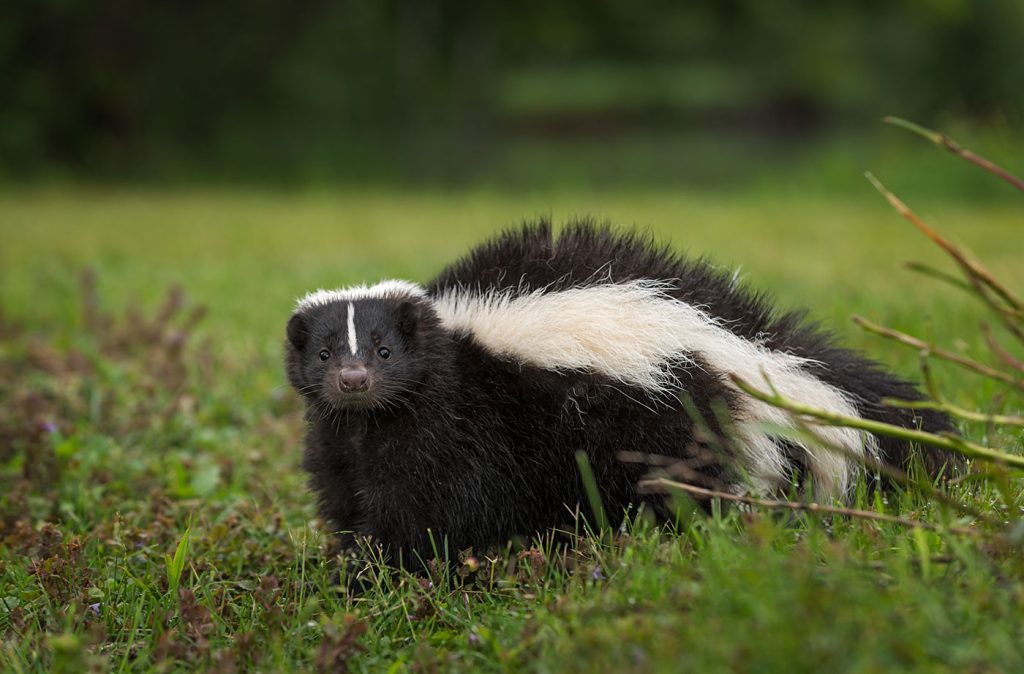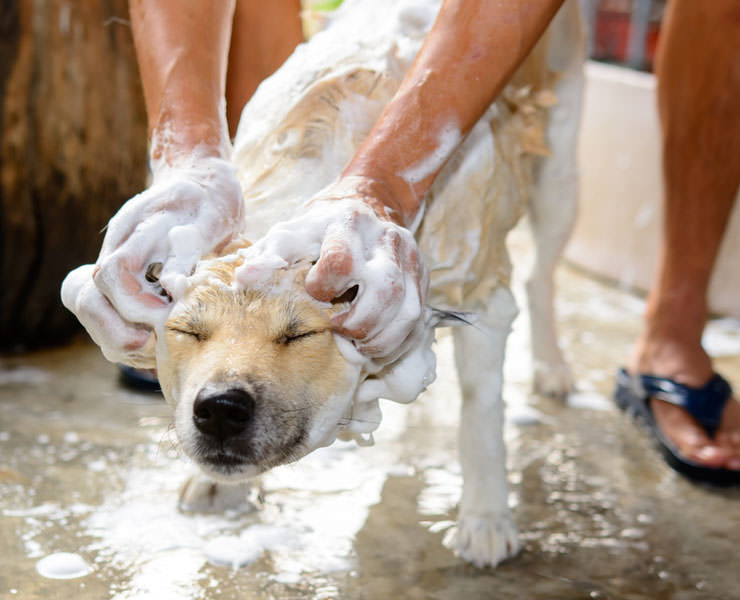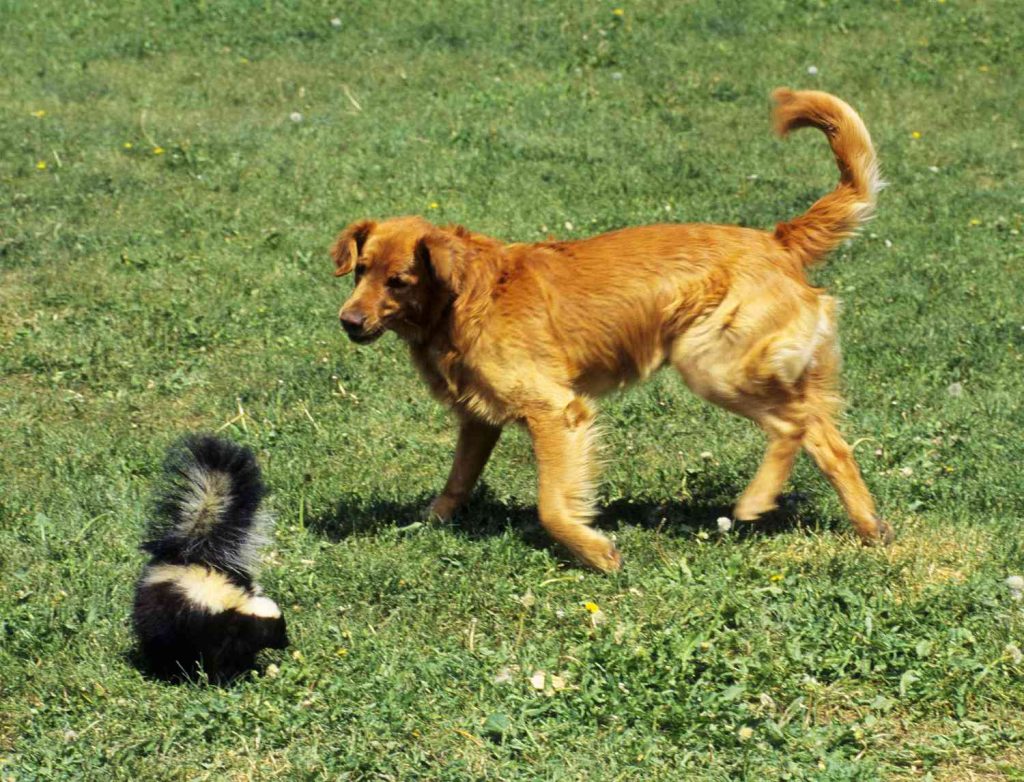Finding your dog has been sprayed by a skunk can be a smelly and unpleasant experience. While the odor of skunk spray is strong and difficult to remove, there are a few things you can do to clean your dog and do your best to eliminate the skunk smell. This article will tell you what to do if your dog is sprayed by a skunk, how to get rid of skunk odor, and how to prevent your dog from being sprayed by a skunk.
What is a Skunk?
Skunks are carnivorous mammals of the Weasel family and are similar in size to domestic cats. It is widely distributed in North America north of Mexico, and is particularly common in Canada and the United States.
The skunk uses its special black and white colors to warn its enemies and uses its smelly gland secretions as a defense weapon. Within a distance of 10—15 feet, skunks generally do not miss their targets. Not only is the skunk’s spray extremely smelly, and it can also cause the person hit to be temporarily blinded. Skunks are one of the major rabies carriers in North America. Currently, little is known about the epidemiology of rabies in skunks, and there is a lack of adequate oral vaccines to halt the spread of the disease.

Is Being Sprayed by a Skunk Harmful to a Dog’s Health?
The skunk spray itself is not toxic or harmful to a dog’s health. However, the powerful smell can cause nausea and discomfort. Some dogs may also have irritated eyes or skin after being sprayed.
The main concern is just removing the very persistent skunk odor from your dog’s fur and skin. If not thoroughly removed, the smell can linger for weeks and cause your home and belongings to smell too.
Why is the Odor of Skunk So Difficult to Remove?
Skunk spray contains several sulfur compounds that are very challenging to neutralize and remove:
Thiols – sulfur-containing organic compounds that have a foul, difficult to remove smell even in small concentrations.
Thioacetates – similar compounds that also contain sulfur and are known for their long-lasting odors.
Mercaptans – another family of sulfur-containing compounds. They are commonly added to natural gas for safety reasons as they have an extremely potent smell.
The oily and acidic nature of skunk spray allows these smelly compounds to persist and stick strongly to surfaces like pet fur. Completely deodorizing a sprayed dog requires breaking down these sulfur compounds.

How to Remove Skunk Odor from a Dog
Removing skunk smell from a dog’s coat requires a careful washing process. Here are some tips:
Mix a Deodorizing Solution
Mix together:
- 1 quart of 3% hydrogen peroxide
- 1⁄4 cup of baking soda
- 1 teaspoon of dish soap
The hydrogen peroxide helps oxidize and break down odor molecules, while the baking soda neutralizes acidic compounds. The dish soap helps this solution penetrate into the fur.
Bathe Your Dog
- Thoroughly wet your dog’s fur with the deodorizing solution. Avoid getting it in eyes, ears or mouth.
- Let the solution sit for 5-10 minutes to break down the smelly compounds.
- Rinse your dog with clean water. You may need to wash several times to fully remove the skunk smell.
- Dry your dog with a towel after their de-skunked bath.

Additional Tips
- Use cool or lukewarm water to prevent opening pores and releasing more odor.
- Feed your dog canned pumpkin or yogurt after bathing to soothe any stomach upset.
- Consult your vet if your pet has any eye irritation or other health concerns after being sprayed.
- Discard any bedding, collars or bowls that absorbed skunk spray. Odor can linger in fabrics.
- Wash any people clothes contaminated by skunk spray separately with enzymatic cleaners or vinegar.
With the proper cleaning solution and technique, you can effectively remove even persistent skunk odor from dogs and restore your home’s fresh scent.
How to Prevent Your Dog From Being Sprayed by Skunks
- While not always possible, here are some tips to avoid unwanted skunk spray encounters:
- Walk and play with your dog during daytime when skunks are less active. Be especially cautious at dawn/dusk.
- Keep your dog on a leash in areas where skunks are known to live. This gives better control if you spot one.
- Try not to let your dog investigate under decks or porches where skunks may den.
- Install motion sensor lights around your home to deter nocturnal skunks.
- Seal any openings in fencing or foundations so skunks can’t sneak underneath.
- Use ammonia soaked rags around the perimeter of your yard. This imitation of predator scent may repel skunks. Avoid letting the ammonia touch grass.
- If you or your dog encounter a skunk, remain calm and quietly back away. Sudden movements may provoke it to spray.
While dog vs skunk meetings will likely happen eventually, being prepared with odor removing solutions and preventing tactics will help make cleanup a breeze. With some caution, we can hopefully avoid having stinky dog situations in the future.

Frequently Asked Questions About Dogs and Skunks
How long does skunk spray odor last on dogs?
If not properly cleaned, skunk odor can last on a dog’s fur and skin for up to a month. The sulfur compounds bind strongly to hair and are difficult to fully neutralize. Thorough washing with deodorizing solutions helps speed the removal.
What home remedies help remove skunk smell?
Common homemade solutions for de-skunking dogs include mixtures of hydrogen peroxide, baking soda, and dish soap. Tomato juice or vinegar baths are other traditional options. These work to chemically neutralize and wash away the smelly oil.
Will my dog get sprayed again after being skunked once?
It depends on the individual dog. Some dogs with high prey drives may still try to chase or corner a skunk after being sprayed before. Dogs that got a good taste of skunk spray will likely be warier in the future. Proper training can help teach dogs to avoid skunks altogether.
Does skunk spray cause dogs to itch?
The oil in skunk spray can sometimes cause mild skin irritation in dogs. Secondary bacterial or fungal skin infections are also possible if the area is not cleaned properly after being sprayed. Use a gentle soap and monitor for any persistent irritation, rashes, or discomfort.
How can I find where skunks are spraying near my home?
Check for areas of dead vegetation or strong skunk odor. Skunks often repeatedly spray the same spots as territorial markers or locations of previous encounters with other animals. Seal any entry points or make the area less hospitable to dissuade repeat skunk visits.
The Takeaway
Being sprayed by a skunk can be a messy and smelly nuisance for dogs and their owners. While not medically harmful, removing that persistent skunk odor requires the right deodorizing techniques. With some prevention measures, we can hopefully keep unwanted skunk encounters to a minimum and enjoy the outdoors with our furry companions.


